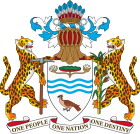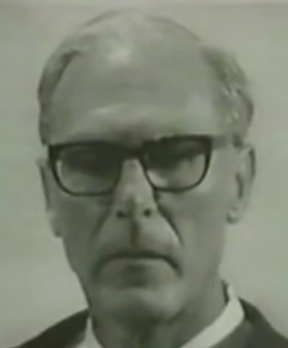 |
|---|
| Constitution |
The Justice Party was an Indo-Guyanese political party in British Guiana.
 |
|---|
| Constitution |
The Justice Party was an Indo-Guyanese political party in British Guiana.
The party was set up in 1964 with assistance from the CIA, and was led by Jai Narine Singh and Balram Singh Rai. [1] [2] Jai Narine Singh asked for $75,000 per month from the United States to fund her political campaign, which was deposited into an account at the Royal Bank of Canada. [1] The American government hoped the new party, together with the Guiana United Muslim Party (which the British government was funding), would take votes from the People's Progressive Party (PPP), whose left-wing leanings they were concerned about. [3] Although the CIA estimated that the Justice Party and GUMP could win three seats in the 1964 general elections, [1] neither did; the Justice Party received only 0.6% of the vote and failed to win a seat, [4] whilst the PPP emerged as the largest party, but was unable to form a government.
The party did not contest any further elections. [5]
The history of Guyana begins about 35,000 years ago with the arrival of humans coming from Eurasia. These migrants became the Carib and Arawak tribes, who met Alonso de Ojeda's first expedition from Spain in 1499 at the Essequibo River. In the ensuing colonial era, Guyana's government was defined by the successive policies of the French, Dutch, and British settlers. During the colonial period, Guyana's economy was focused on plantation agriculture, which initially depended on slave labor. Guyana saw major slave rebellions in 1763 and 1823. Following the Slavery Abolition Act of 1833, 800,000 enslaved Africans in the Caribbean and South Africa were freed, resulting in plantations contracting indentured workers, mainly from India. Eventually, these Indians joined forces with Afro-Guyanese to demand equal rights in government and society. After the Second World War, the British Empire pursued policy decolonization of its overseas territories, with independence granted to British Guiana on May 26, 1966. Following independence, Forbes Burnham rose to power, quickly becoming an authoritarian leader, pledging to bring socialism to Guyana. His power began to weaken following international attention brought to Guyana in wake of the Jonestown mass murder suicide in 1978.

British Guiana was a British colony, part of the mainland British West Indies. It was located on the northern coast of South America. Since 1966 it has been known as the independent nation of Guyana.

Cheddi Berret Jagan was a Guyanese politician and dentist who was first elected Chief Minister in 1953 and later Premier of British Guiana from 1961 to 1964. He later served as President of Guyana from 1992 to his death in 1997. In 1953, he became the first Hindu and person of Indian descent to be a head of government outside of the Indian subcontinent.

Linden Forbes Sampson Burnham was a Guyanese politician and the leader of the Co-operative Republic of Guyana from 1964 until his death in 1985. He served as Premier of British Guiana from 1964 to 1966, Prime Minister of Guyana from 1964 to 1980 and then as the first executive president of Guyana from 1980 to 1985. He is often regarded as a strongman who embraced his own version of socialism.

Elections in Guyana take place within the framework of a multi-party representative democracy and a presidential system. The National Assembly is directly elected, with the nominee of the party or alliance that receives the most votes becoming President.

The People's Progressive Party/Civic (PPP/C) is a major political party in Guyana. As of 2020, the party holds 33 of the 65 seats in the National Assembly and forms the government. It has been the ruling party in the past as well, most recently between 1992 and 2015. In Guyana's ethnically divided political landscape, the PPP/C is a multi-ethnic organization.

The People's National Congress Reform (PNCR) is a social-democratic and democratic socialist political party in Guyana led by Aubrey Norton. The party currently holds 31 of the 65 seats in the National Assembly. In Guyana's ethnically divided political landscape, the PNCR is a multi-ethnic organization.
United Force (UF) is a conservative and economically liberal political party in Guyana. It currently has no representation in the National Assembly and is led by Marissa Nadir.

The Constitution of Guyana is the highest governing document in the Republic of Guyana. It came into effect on October 6, 1980, replacing the constitution enacted in 1966 upon its independence from the United Kingdom. The current Constitution of Guyana contains 12 chapters that are further divided into 232 articles. It also contains a preamble and an oath. Since its 1980 enactment, it has gone through multiple amendments.

General elections were held in British Guiana on 27 April 1953. They were the first held under universal suffrage and resulted in a victory for the People's Progressive Party (PPP), which won 18 of the 24 seats in the new House of Assembly. Its leader, Cheddi Jagan, became prime minister.

General elections were held in British Guiana on 21 August 1961. The result was a victory for the People's Progressive Party, which won 20 of the 35 seats.

The National Republican Party (NRP) was a right-wing political party in Guyana.
The Peace, Equality and Prosperity Party was a political party in British Guiana led by Kelvin De Freitas.

The National Labour Front (NLF) was a political party in Guyana.

The Guiana United Muslim Party (GUMP) was a Muslim political party in Guyana.

Good and Green Guyana (GGG) was a political party in Guyana.

The House of Assembly was the legislature of British Guiana in the 1950s and 1960s.

The Legislative Assembly was the lower house of the Legislature in British Guiana between 1961 and 1964.
Balram Singh Rai was a Guyanese politician. He served as Minister of Community Development and Education from 1959 to 1961, then the first Minister of Home Affairs from 1961 to 1962.

Peter Stanislaus D'Aguiar was a Guyanese-Portuguese businessman, conservative politician, and minister of finance from 1964 to 1967.